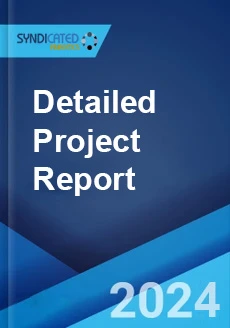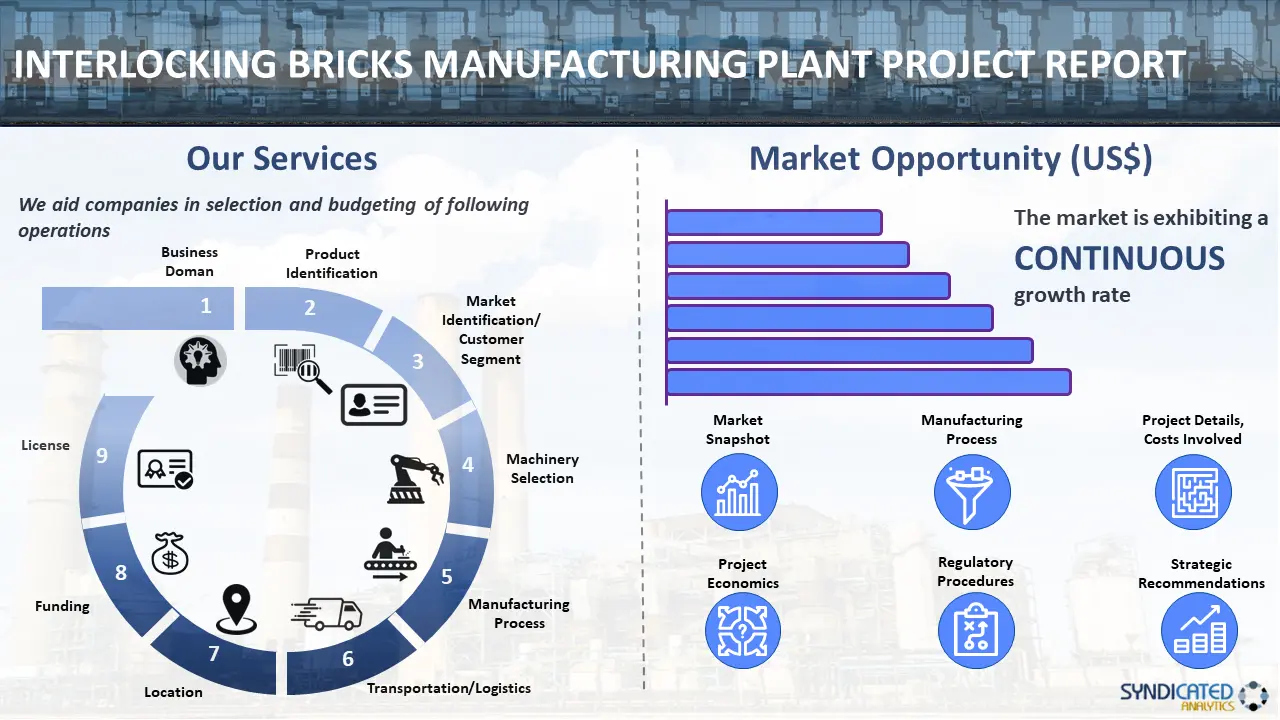
Interlocking Bricks Manufacturing Plant Project Report 2025 Edition
Report Coverage: Industry Analysis (Market Performance, Segments, Price Analysis, Outlook), Detailed Process Flow (Product Overview, Unit Operations, Raw Materials, Quality Assurance), Requirements and Cost (Machinery, Raw Materials, Packaging, Transportation, Utility, Human Resource), Project Economics (Capital Investments, Operating Costs, Profit Projections, Financial Analysis, Revenue), and Investment Opportunities
Report Overview:
Syndicated Analytics report, titled “Interlocking Bricks Manufacturing Plant Project Report 2025 Edition: Industry Analysis (Market Performance, Segments, Price Analysis, Outlook), Detailed Process Flow (Product Overview, Unit Operations, Raw Materials, Quality Assurance), Requirements and Cost ( Machinery, Raw Materials, Packaging, Transportation, Utility, Human Resource), Project Economics (Capital Investments, Operating Costs, Profit Projections, Financial Analysis, Revenue), and Investment Opportunities,” provides a complete roadmap for setting up a interlocking bricks manufacturing plant. It covers a comprehensive market overview to micro-level information such as unit operations involved, raw material requirements, utility requirements, infrastructure requirements, machinery and technology requirements, manpower requirements, packaging requirements, transportation requirements, etc. The report provides detailed insights into project economics, including capital investments, project funding, operating expenses, income and expenditure projections, fixed costs vs. variable costs, direct and indirect costs, expected ROI and net present value (NPV), profit and loss account, financial analysis, etc. This report is a must-read for entrepreneurs, investors, researchers, consultants, and business strategists with a stake in the interlocking bricks industry. It provides an in-depth analysis of the industry's current state and future potential, offering valuable insights for decision-making and strategy development. The report is an indispensable resource that offers a detailed examination of the interlocking bricks industry. It is a valuable tool for anyone seeking to establish a foothold in this dynamic sector.

Interlocking bricks, also known as interlocking concrete blocks, are building materials manufactured with a unique mechanism that allows them to fit together like puzzle pieces without the need for mortar or adhesive. They are ideal for constructing retaining walls due to their ability to withstand the pressure of retaining soil and preventing erosion. They provide a cost-effective and efficient alternative to traditional bricks, reducing construction time and labor costs. They also offer cushioning and impact resistance, reducing the risk of injuries. They assist in creating erosion control structures, as they prevent soil erosion by stabilizing slopes and water runoff. They are used for paving driveways, pathways, and sidewalks due to their precise fit and uniform appearance that create visually appealing and durable surfaces. They are often used to create neat and attractive garden borders to define the boundaries of flower beds and lawns, enhancing the overall landscaping. They are employed in building water features, such as fountains, ponds, and waterfalls, adding an aesthetic touch to outdoor spaces.
Market Trends/Drivers:
At present, interlocking bricks are recognized for their eco-friendly attributes, as they reduce the need for traditional mortar, which often contains harmful chemicals. Additionally, interlocking brick systems allow for rainwater to permeate the ground, reducing stormwater runoff and improving groundwater recharge. These sustainable practices align with global efforts to promote green building solutions and reduce the carbon footprint of construction projects. Besides this, interlocking bricks are relatively easy to produce, and their installation requires less skilled labor and time compared to traditional masonry. As a result, construction companies can reduce labor costs and complete projects more quickly, leading to cost savings for both residential and commercial builders. Moreover, interlocking bricks can withstand harsh weather conditions, resist erosion, and remain structurally stable over time. This durability is leading to reduced maintenance costs for property owners, making interlocking bricks an attractive choice for various applications, including pavements, retaining walls, and building exteriors. In addition, the interlocking design of these bricks allows for versatile and creative architectural designs. Builders can easily create curved or intricate patterns, resulting in aesthetically pleasing structures. This design flexibility appeals to architects, designers, and property owners seeking unique and visually appealing construction solutions.
The project report provides a comprehensive analysis of the interlocking bricks market, covering various critical aspects. The following sections are included:
Market Overview:
- Market Performance Analysis
- Regional Coverage
- Key Market Segmentation
- Price Trend Analysis
- COVID-19 Impact Analysis
- Market Forecast and Outlook
- Key Market Players
The report provides an analysis of the global interlocking bricks market performance, market breakup by segment and region, price trends, key market players and impact of COVID-19 on the market. Additionally, it offers insights into the market outlook, including growth opportunities and challenges that may impact the industry's future.
Manufacturing Operations:
- Product Description and Insights
- Detailed Process Flow Analysis
- Identification of Unit Operations Involved
- Mass Balance Analysis and Raw Material Requirements
- Quality Control
The report offers a detailed insight into the manufacturing process for interlocking bricks. It covers the product insights, the process flow, unit operations involved, quality control, as well as the mass balance and raw material requirements involved.
Project Requirements, Details, and Costs:
- Site Development, Location, and Land Requirements
- Plant Layout
- Machinery Requirements and Associated Costs
- Raw Material Requirements and Associated Costs
- Packaging Requirements and Associated Costs
- Transportation Requirements and Associated Costs
- Utility Requirements and Associated Costs
- Manpower Requirements and Associated Costs
This section covers the project details, requirements, and costs involved in setting up an interlocking bricks manufacturing plant. It provides information on land, location, and site development, plant layout, machinery requirements and expenditures, raw material and packaging requirements and expenditures, transportation requirements and expenditures, utility requirements and expenditures, as well as manpower requirements and expenditures.
Project Financial Analysis:
- Capital Investments Analysis
- Operating Costs Analysis
- Expenditure Projections Analysis
- Revenue Projections Analysis
- Taxation and Depreciation Analysis
- Profit Projections Analysis
- Comprehensive Financial Analysis
The report also covers a comprehensive analysis of the project economics for setting up an interlocking bricks manufacturing plant. This includes the analysis of capital expenditure (CapEx), operating expenditure (OpEx), income projections, taxation, depreciation, liquidity analysis, profitability analysis, payback period, NPV, uncertainty analysis, and sensitivity analysis.
Customized Solutions and Report Features:
The report can be customized based on your specific requirements. This may include information on the country/region you plan to set up your plant, manufacturing capacity, machinery suppliers and costs, and any additional scope requirements. Some of the customizations requested by our clients include:
- Customization based on the location of your plant
- Manufacturing capacity customization
- Machinery supplier and cost customization
- Additional scope based on your specific needs
The report offers valuable insights into the interlocking bricks market, covering critical aspects such as market performance, manufacturing processes, project details, project economics, and key success and risk factors. With its comprehensive analysis, it is an essential resource for entrepreneurs, investors, researchers, consultants, and business strategists interested in the industry.
Report Scope:
| Report Features | Details |
|---|---|
| Product Name | Interlocking Bricks |
| Report Coverage | Detailed Process Flow: Unit Operations Involved, Quality Assurance Criteria, Technical Tests, Mass Balance, and Raw Material Requirements Land, Location and Site Development: Selection Criteria and Significance, Location Analysis, Project Planning and Phasing of Development, Environmental Impact, Land Requirement and Costs Plant Layout: Importance and Essentials, Layout, Factors Influencing Layout Plant Machinery: Machinery Requirements, Machinery Costs, Machinery Suppliers (Provided on Request) Raw Materials: Raw Material Requirements, Raw Material Details and Procurement, Raw Material Costs, Raw Material Suppliers (Provided on Request) Packaging: Packaging Requirements, Packaging Material Details and Procurement, Packaging Costs, Packaging Material Suppliers (Provided on Request) Other Requirements and Costs: Transportation Requirements and Costs, Utility Requirements and Costs, Energy Requirements and Costs, Water Requirements and Costs, Human Resource Requirements and Costs Project Economics: Capital Costs, Techno-Economic Parameters, Income Projections, Expenditure Projections, Product Pricing and Margins, Taxation, Depreciation Financial Analysis: Liquidity Analysis, Profitability Analysis, Payback Period, Net Present Value, Internal Rate of Return, Profit and Loss Account, Uncertainty Analysis, Sensitivity Analysis, Economic Analysis Other Analysis Covered in The Report: Market Trends and Analysis, Market Segmentation, Market Breakup by Region, Price Trends, Competitive Landscape, Regulatory Landscape, Strategic Recommendations, Case Study of a Successful Venture |
| Currency | US$ (Information can also be provided in the local currency) |
| Pricing and Purchase Options | Single User License: US$ 3450 Five User License: US$ 4450 Corporate User License: US$ 5450 |
| Customization Scope | The report can also be customized based on the requirement of the customer |
| Post-Sale Analyst Support | 12-14 Weeks |
| Delivery Format | PDF and Excel through email (We can also provide the editable version of the report in PPT/Word format on special request) |
The report also answers several key questions for stakeholders who are planning to enter the interlocking bricks market. Some of these include:
- What are the major success and risk factors in the global interlocking bricks industry?
- How has the global interlocking bricks market performed thus far and what is its future outlook?
- What is the industry's structure and who are the key players?
- What unit operations are involved in an interlocking bricks manufacturing plant?
- How much land is required for an interlocking bricks manufacturing plant?
- What machinery is required for an interlocking bricks manufacturing plant?
- What are the raw materials needed for an interlocking bricks manufacturing plant?
- What utility requirements are there for an interlocking bricks manufacturing plant?
- What is the manpower requirement for an interlocking bricks manufacturing plant?
- What is the infrastructure cost for an interlocking bricks manufacturing plant?
- What are the capital costs for an interlocking bricks manufacturing plant?
- What are the operating costs for an interlocking bricks manufacturing plant?
- What is the pricing mechanism for interlocking bricks?
- What are the income and expenditure for an interlocking bricks manufacturing plant?
- How long does it take to break-even?
Why Our Reports Stand Out:
- Gain valuable insights into your business venture's potential, allowing you to make informed decisions.
- Access a global network of consultants and domain experts in 100+ countries across North America, Europe, Asia Pacific, South America, Africa, and the Middle East.
- Benefit from our extensive database of equipment and raw material suppliers from all major continents.
- Stay up-to-date with the latest global data on land costs, construction costs, utility costs, labor costs, and more in 100+ countries.
- Join a diverse range of satisfied clients, including Fortune 500 companies, governments, institutions, and small startups.
- Receive support from our expert in-house team of engineers, statisticians, modeling experts, chartered accountants, architects, and more, who have played a critical role in building, expanding, and optimizing sustainable manufacturing plants worldwide.
Purchase Options
Ask For Customization
Personalize this research
Triangulate with your own data
Get data as per your format and definition
Gain a deeper dive on a specific application, geography, customer or competitor
Any level of personalization
Get in Touch
Call us on
US: +1-213-316-7435
Uk: +44-20-8040-3201
Drop us an email at
sales@syndicatedanalytics.com